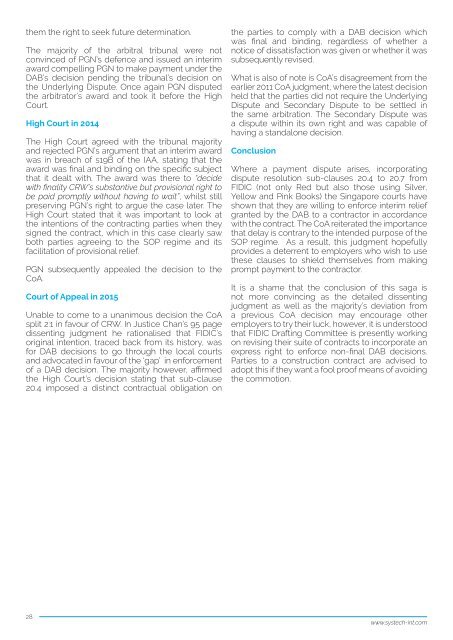SYSTECH SOLICITORS LEGAL UPDATE
4mW0Sv
4mW0Sv
You also want an ePaper? Increase the reach of your titles
YUMPU automatically turns print PDFs into web optimized ePapers that Google loves.
them the right to seek future determination.<br />
The majority of the arbitral tribunal were not<br />
convinced of PGN’s defence and issued an interim<br />
award compelling PGN to make payment under the<br />
DAB’s decision pending the tribunal’s decision on<br />
the Underlying Dispute. Once again PGN disputed<br />
the arbitrator’s award and took it before the High<br />
Court.<br />
High Court in 2014<br />
The High Court agreed with the tribunal majority<br />
and rejected PGN’s argument that an interim award<br />
was in breach of s19B of the IAA, stating that the<br />
award was final and binding on the specific subject<br />
that it dealt with. The award was there to “decide<br />
with finality CRW’s substantive but provisional right to<br />
be paid promptly without having to wait”, whilst still<br />
preserving PGN’s right to argue the case later. The<br />
High Court stated that it was important to look at<br />
the intentions of the contracting parties when they<br />
signed the contract, which in this case clearly saw<br />
both parties agreeing to the SOP regime and its<br />
facilitation of provisional relief.<br />
PGN subsequently appealed the decision to the<br />
CoA.<br />
Court of Appeal in 2015<br />
Unable to come to a unanimous decision the CoA<br />
split 2:1 in favour of CRW. In Justice Chan’s 95 page<br />
dissenting judgment he rationalised that FIDIC’s<br />
original intention, traced back from its history, was<br />
for DAB decisions to go through the local courts<br />
and advocated in favour of the ‘gap’ in enforcement<br />
of a DAB decision. The majority however, affirmed<br />
the High Court’s decision stating that sub-clause<br />
20.4 imposed a distinct contractual obligation on<br />
the parties to comply with a DAB decision which<br />
was final and binding, regardless of whether a<br />
notice of dissatisfaction was given or whether it was<br />
subsequently revised.<br />
What is also of note is CoA’s disagreement from the<br />
earlier 2011 CoA judgment, where the latest decision<br />
held that the parties did not require the Underlying<br />
Dispute and Secondary Dispute to be settled in<br />
the same arbitration. The Secondary Dispute was<br />
a dispute within its own right and was capable of<br />
having a standalone decision.<br />
Conclusion<br />
Where a payment dispute arises, incorporating<br />
dispute resolution sub-clauses 20.4 to 20.7 from<br />
FIDIC (not only Red but also those using Silver,<br />
Yellow and Pink Books) the Singapore courts have<br />
shown that they are willing to enforce interim relief<br />
granted by the DAB to a contractor in accordance<br />
with the contract. The CoA reiterated the importance<br />
that delay is contrary to the intended purpose of the<br />
SOP regime. As a result, this judgment hopefully<br />
provides a deterrent to employers who wish to use<br />
these clauses to shield themselves from making<br />
prompt payment to the contractor.<br />
It is a shame that the conclusion of this saga is<br />
not more convincing as the detailed dissenting<br />
judgment as well as the majority’s deviation from<br />
a previous CoA decision may encourage other<br />
employers to try their luck, however, it is understood<br />
that FIDIC Drafting Committee is presently working<br />
on revising their suite of contracts to incorporate an<br />
express right to enforce non-final DAB decisions.<br />
Parties to a construction contract are advised to<br />
adopt this if they want a fool proof means of avoiding<br />
the commotion.<br />
28<br />
www.systech-int.com


